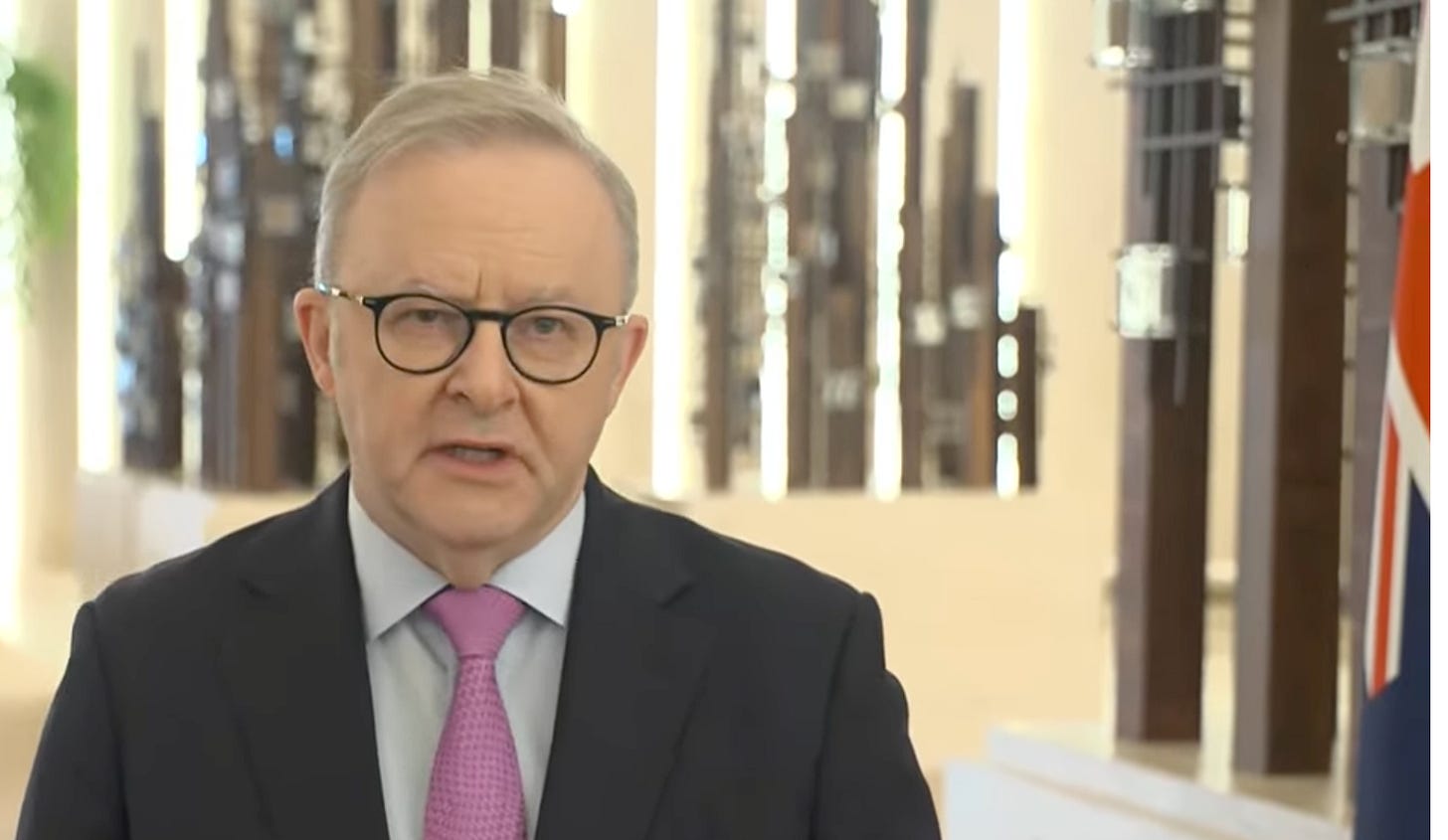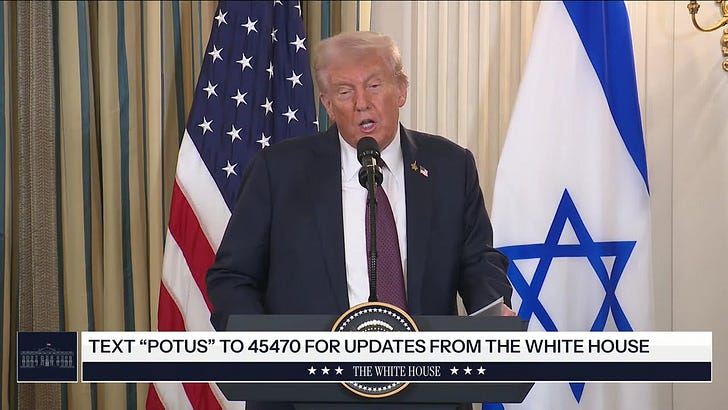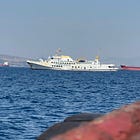Australia Backs Trump’s Gaza Peace Plan, Urges Hamas to Surrender Arms
This piece is freely available to read. Become a paid subscriber today and help keep Mencari News financially afloat so that we can continue to pay our writers for their insight and expertise.
Today’s Article is brought to you by Empower your podcasting vision with a suite of creative solutions at your fingertips.
Australian Prime Minister Anthony Albanese endorsed the U.S.-sponsored peace plan for Gaza on Tuesday, calling on Hamas to surrender its weapons and release all hostages as part of international efforts to end the 18-month conflict.
Speaking in Abu Dhabi before departing for the United States, Albanese said Australia affirmed the plan’s commitment to preventing Hamas from any future role in governing Gaza and urged all parties to implement the proposal without delay.
“Australia affirms the plan’s commitment to denying Hamas any role in the future governance of Gaza, calls on Hamas to agree to the plan, lay down its arms and release all remaining hostages,” Albanese said.
The prime minister’s remarks represented Australia’s formal response to the 20-point peace framework unveiled Monday by President Donald Trump and Israeli Prime Minister Benjamin Netanyahu at the White House. The plan calls for a ceasefire, hostage exchanges, Israeli withdrawal from Gaza and establishment of an international governing body for the territory.
Truth matters. Quality journalism costs.
Your subscription to Mencari directly funds the investigative reporting our democracy needs. For less than a coffee per week, you enable our journalists to uncover stories that powerful interests would rather keep hidden. There is no corporate influence involved. No compromises. Just honest journalism when we need it most.
Not ready to be paid subscribe, but appreciate the newsletter ? Grab us a beer or snag the exclusive ad spot at the top of next week's newsletter.
Albanese said Australia had long advocated for an end to the fighting.
“Australia has long called for a ceasefire. We have called for the hostages to be released and for Hamas to give up its arms,” he said. “I certainly have welcomed the opportunity to discuss the plans for a ceasefire moving forward over the past week with a range of leaders.”
The prime minister emphasized the humanitarian crisis facing Gaza’s civilian population.
“Australia wants to see aid given to the desperate people of Gaza who need this peace plan,” Albanese said, describing the conflict as causing “a devastating loss of life.”
Australia’s position aligned with other international supporters of the U.S. framework. Albanese noted broad regional backing for the proposal, including from the Palestinian Authority and countries with significant Muslim populations.
“We commend the focus which is there in the plan for Palestinian self-determination and statehood and the Palestinian Authority support for the plan, along with so many other nations in the region and countries which have populations of larger Muslim populations such as Indonesia and Pakistan,” he said.
The prime minister issued a direct appeal to all parties involved in the conflict.
“Australia urges all parties to engage seriously with the plan and to work to bring its vision into reality without delay,” Albanese said. “Together with our partners, Australia will continue to support efforts to end the war and work towards a just and sustainable two-state solution.”
Australia formally recognized Palestinian statehood last week during the United Nations General Assembly in New York, joining more than 140 nations that have taken similar steps. The recognition came as Trump presented his peace framework to Gulf states on the sidelines of the gathering.
Albanese’s comments came during a Middle East trip that precedes a planned visit to Washington. When asked whether Australia’s support for the Gaza plan would benefit his upcoming U.S. visit, the prime minister shifted to discussing the AUKUS defense partnership.
“The AUKUS review remains ongoing, but we’ve been participating very constructively with it,” Albanese said. “And AUKUS has been meeting its milestones.”
The prime minister expressed confidence in the trilateral security pact between Australia, the United Kingdom and the United States, which aims to provide Australia with nuclear-powered submarines.
“We know that AUKUS is in the interests of Australia, the United Kingdom and the United States,” he said. “It is about a partnership which is in the interest of all three nations which will make peace and security in our region so much stronger.”
Albanese also addressed domestic telecommunications failures during the news conference, responding to questions about recent Optus emergency call system outages that left Australians unable to reach triple-0 services.
“We’re not satisfied with any of Optus’ behaviour,” Albanese said. “Optus has let down its customers and has let down the nation.”
The prime minister said investigations into the failures were continuing and praised Communications Minister Annika Wells for taking a strong stance against the telecommunications company.
“There will be, of course, there’s ongoing investigation into how exactly this has occurred,” he said. “And Minister Wells has been very strong, as is entirely appropriate here, for what is an unacceptable failure of service by Optus to its customers and to the nation.”
The Optus failures have triggered government demands for external oversight and potential significant penalties following multiple outages in recent years. Wells met Tuesday with Singtel chief executive Yuen Kuan Moon and Optus board chair John Arthur in Sydney, where she described the situation as “completely unacceptable.”
Singtel, which owns Optus, blamed the Sept. 18 emergency call system failure on human error, saying staff missed critical procedural steps. The Australian Communications and Media Authority has launched an investigation into the outages.
Australia’s position on the Gaza peace plan places the country among a growing coalition of nations supporting Trump’s diplomatic initiative. French President Emmanuel Macron and British Prime Minister Keir Starmer both welcomed the proposal Monday, though Hamas has not yet formally responded to the framework.
The plan faces significant obstacles, including questions about whether Netanyahu can maintain support from right-wing coalition partners for provisions such as potential amnesty for Hamas fighters. Security analysts have also raised concerns about the proposed international governing body’s perceived impartiality, particularly with Trump suggesting he would chair the Board of Peace.
Albanese’s statement emphasized Australia’s commitment to humanitarian aid delivery and Palestinian self-determination, reflecting the government’s effort to balance support for the peace framework with concerns about civilian suffering in Gaza. The prime minister made no mention of specific Australian contributions to potential peacekeeping or reconstruction efforts.
The conflict began 18 months ago and has resulted in massive destruction across Gaza. Israeli military operations continued Tuesday even as diplomatic efforts advanced, with tanks pushing deeper into Gaza City in what officials described as one of the largest offensives since fighting began.
Trump has repeatedly claimed since taking office in January that a peace deal was imminent, though previous announcements failed to produce concrete results. Monday’s joint appearance with Netanyahu at the White House represented the most detailed framework yet for ending the conflict.
Albanese’s endorsement came as Australia prepared to participate in broader international discussions about implementing the peace plan and establishing governance structures for Gaza. The prime minister offered no timeline for when Australia might contribute personnel or resources to any international administration of the territory.
The statement from Abu Dhabi concluded with Albanese preparing to board a flight, with his U.S. visit expected to include discussions about both the Gaza situation and the AUKUS defense partnership. Australian officials have not announced a specific meeting schedule for the Washington trip.
Sustaining Mencari Requires Your Support
Independent journalism costs money. Help us continue delivering in-depth investigations and unfiltered commentary on the world's real stories. Your financial contribution enables thorough investigative work and thoughtful analysis, all supported by a dedicated community committed to accuracy and transparency.
Subscribe today to unlock our full archive of investigative reporting and fearless analysis. Subscribing to independent media outlets represents more than just information consumption—it embodies a commitment to factual reporting.
As well as knowing you’re keeping Mencari (Australia) alive, you’ll also get:
Get breaking news AS IT HAPPENS - Gain instant access to our real-time coverage and analysis when major stories break, keeping you ahead of the curve
Unlock our COMPLETE content library - Enjoy unlimited access to every newsletter, podcast episode, and exclusive archive—all seamlessly available in your favorite podcast apps.
Join the conversation that matters - Be part of our vibrant community with full commenting privileges on all content, directly supporting The Evening Post (Australia)
Catch up on some of Mencari’s recent stories:
It only takes a minute to help us investigate fearlessly and expose lies and wrongdoing to hold power accountable. Thanks!








